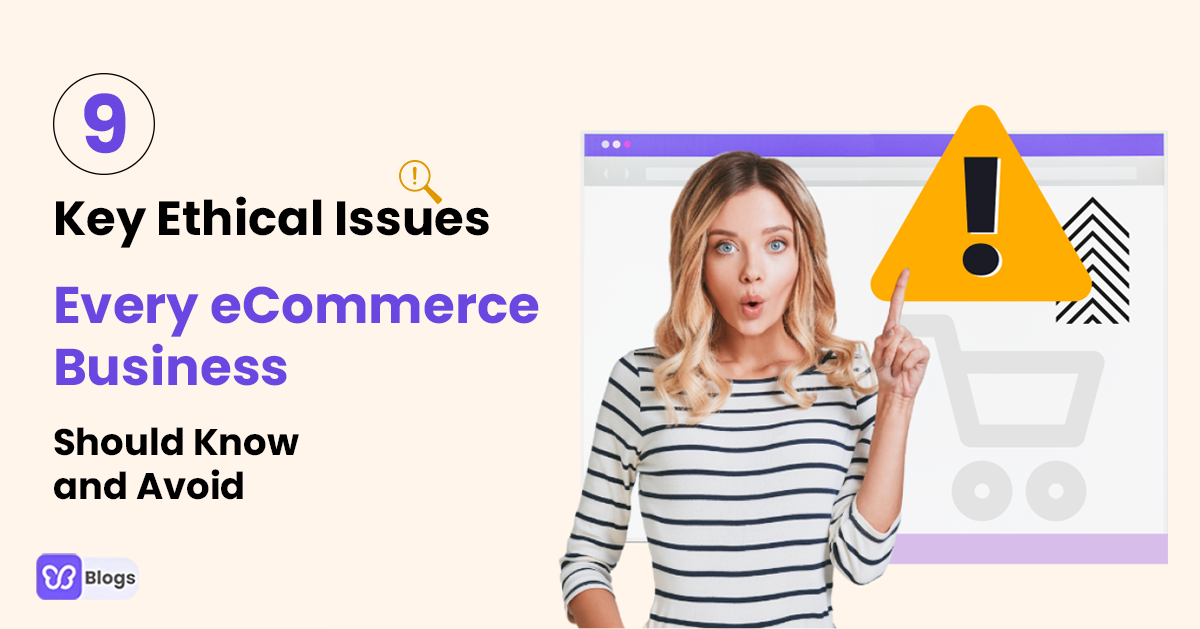Imagine this...
Your eCommerce business is thriving more than ever.
You have a steady stream of customers visiting your online store.
Sales and revenue are skyrocketing, exceeding your expectations.
It's a hit!
But then...
Out of nowhere, your business comes crashing down!
Just when you are succeeding, you experience a downfall that is hard to recover from.
The reason? You might be breaking an ethical guideline you're not aware of.
I know it sounds scary, but ethical issues in eCommerce are important for you to be aware of as a business owner.
When you know the dangers you may encounter, you will have the foresight to avoid them.
Keep reading as we go over these key points:
- Why business ethics matter for your success
- Different ethical issues in business you need to look out for
- Ethical guidelines for you to follow
Right off the bat...
Why is Ethics in eCommerce Important?
Let's face it...
Ethics is more than knowing what is right and what is wrong. It's about the values we hold and implement.
They are the moral principles that guide behavior, and they are crucial for business success on multiple levels.
Businesses, their employees and investors, and more importantly, your customers know that.
And when you hold on to your principles and customs, you are bound to offer a great customer experience.
With exceptional customer satisfaction, you will gain the trust and loyalty of your customers.
Here's how that can immensely benefit your brand.
43% of consumers spend more on businesses they are loyal to. Also, building a trusting relationship with them can increase your profit by up to 95%.
Unfortunately, there are inequalities in the online business world.
There will be ethical challenges that you have to jump through to last.
Let's get to...
9 Ethical Issues In eCommerce You Need To Be Aware Of

If you think piracy only happens on the high seas, think again. Because the first one we will be tackling is...
1. Online Piracy

This is a great challenge that plagues online businesses.
It's when an unauthorized party takes ownership of electronic intellectual property.
This may happen out of ignorance of the law. In other cases, it may accidentally happen.
Just take a look at the common violations:
❌ Imitative Logos. Your logo is an essential part of your branding. It's designed to represent your business to your target audience. To spend less, others copy an already existing design.
❌ Plagiarized Content. Starting businesses might not have enough budget for content marketing. They may copy blog posts, newsletters, product descriptions, captions, etc.
❌ Image And Video Theft. High-quality photos are a must for an excellent website. Copyrighted videos are also important for advertising. These marketing tools can be expensive. Some people think it's better to steal them for their own website.
The very nature of stealing can lead to lawsuits. Or worse, your website is bound for suspension and poor SERPs ranking.
So, what is the best course of action you can do?
Be original!
Create your own content. Hire content writers, photographers, and other content creators to create something new for you.
Of course, it doesn't hurt to document all of your transactions to show you are the authorized organization.
You can also leverage Debutify's Shop Protectors. The Add-On Shop Protect secures your product description, images, articles, and other content from thieves.

When we talk about electronic commerce, we need to consider customer data.
That leads us to...
2. Vulnerable Data Lakes
A data lake is a storage of a large amount of raw data.
It may sound like a good thing. But don't be fooled!
Data lakes are like hoarding data subjects, and I hope they may be useful someday.
And they are prone to security breaches.
Here's more. The log data can slow down your system. And you won't even be able to keep track of all of them. Using vulnerability scanners is essential to identify and address potential security weaknesses in your data lake. These scanners help detect vulnerabilities, assess their severity, and provide recommendations to mitigate the risks
Plus, they are unethical and illegal.
You see, storing identifiable personal details of users is illegal. It's a matter of privacy concerns for the General Data Protection Regulation (GDPR).
You could get fines!
Sadly, many organizations hold heaps of users' personal details for profit. They are endangering the privacy of their customers, which can create a huge problem for the business itself.
Scared of your surfing history being tracked?
Well, it's possible with...
3. Web Tracking

Online companies track individuals' movement on their web activities with log files.
They will use the data to install software that can pluck relevant information from files in-house.
The tracking software and the special files called cookies can monitor your customer's stored tracking history.
What does that mean for customer privacy?
The computer will know everything about your visit to web pages and history.
In fact, a certain data mining application combines your users' internet browsing history.
Thankfully, many smart end-users install an application service to control cookies.
To combat web trackers, computer end-users can also protect their data by erasing browser cache and cookies.
There are also specially designed programs that combat other malicious programs.
Another issue you need to keep an eye on?
Some eCommerce businesses also need to be aware of electronic deception with their electronic payment systems. Your customer's identity on your electronic payment system should be of utmost confidentiality.
But it's not just the customers that are in peril.
Data protection also covers your employees.
Let me explain.
Some companies install monitoring systems to identify employees who do non-business activities during business hours. It can monitor e-mail and other activities.
A lot of workers find this inappropriate and unethical.
With an online medium, there's also the downfall of...
4. Cyber-Squatting
This refers to registering an existing domain name with the intent of selling it for a higher price.
The people who do this are called cyber squatters. They usually target well-known organizations.
The person or firm registers and purchases an organization's domain. Then, they will extort the original trademark's owner. The payment occurs when they get the price they ask for.
To protect your business, you can leverage authentication and non-repudiation.
Unlike physical stores, you have to worry about...
5. Web Spoofing
This electronic deception relates to an attacker creating a fake website. They will make it look like the original website to bait customers for their credit card details.
With a fake website, they can reveal the credit card numbers of your customers. They can also access personal details belonging to customers, such as bank account details.
For instance, the bogus website can be called amaz0n.com. They use the number "0" instead of the letter "O".
Unsuspecting visitors will enter their information unknowingly.
Let's go into the topic of digital telecommunications for a bit...
6. Email Spamming

Spamming means when attackers send users a bogus email that contains viruses or malware. Malicious programs delivered quietly can steal information on your computer.
It can also include clickable links that defraud them. This activity is called phishing.
Others also broadcast unwanted advertisements to customers.
To avoid phishing and impersonation attacks from your domain, it's important to establish solid email security with DMARC authentication.
As an eCommerce business, you gather customer emails so you can keep in touch with them. They also have the option to opt-in to your subscription.
To continue building on their trust, do not "spam" your subscribers with a heaping amount of emails. Find a good balance so you to not look "spammy."
Or else, you'll end up in their spam folder forever.
You might think that you can patch all the holes in your business.
But the next one is tricky...
7. Counterfeit Products
You try your hardest to give the best quality products to your customers.
So be vigilant!
Let me give you a better idea...
When you are an online retailer or use third-party suppliers, you may be open to this risk.
You don't necessarily know where your product will be coming from. You can become a victim of fake products.
To prevent this, you can...
- Personally check your products. Buy a few of your products to check their quality.
- Verify with your manufacturer. Ask for the product's serial number and visual identifiers.
- Work with trustworthy suppliers. Check with legit organizations such as the Better Business Bureau. Talk with other retailers about their experiences.
The next one may seem impossible, but it happens...
8. Unreliable Customer Service
When customers have issues or questions about your product or service, they will contact you.
And as a stand-up business, you commit yourself to providing the best customer service.
Unethical businesses, however, do the opposite. They may decline to answer emails or any other communication efforts.
With their refusal, they hope that the customer will just give up on their issue.
That means it will be too late for them to request a chargeback from their credit card company.
Isn't that the most dishonest thing you've ever heard?
All of these issues sound bleak.
But to be a dependable business, consider the next section...
Ethical Benchmarks Your eCommerce Brand Needs To Follow

To have a more ethical approach to your operations, take a look at these ethical guidelines to boost customer trust:
- Transparency. By being transparent, you let your customers know what data you are collecting and what you will use it for. Display your data policy to be more trustworthy.
- Integrity. Your foundation should have clear policies and guidelines for you to follow. That way, you can rightly manage any wrong behavior.
- Trustworthiness. Fulfill all your promises and commitments to your customers.
- Respect. Value your customers' rights and privacy. Protect their information to the standard of your country's laws.
And that's how you get to...
Be An Ethical eCommerce Business Your Customers Trust!
Remember what business magnate Jack Ma said...
"Never deceive others, in business or in life... A company can not go far by deceit."
When you run an honest business, you'll thrive in the long run.
The next step you can take is to choose Debutify Theme to be your Shopify theme!
Leading eCommerce entrepreneurs trust it because it's THE all-in-one eCommerce solution.
Debutify offers 50+ Add-Ons, and you can boost conversions and profits!





